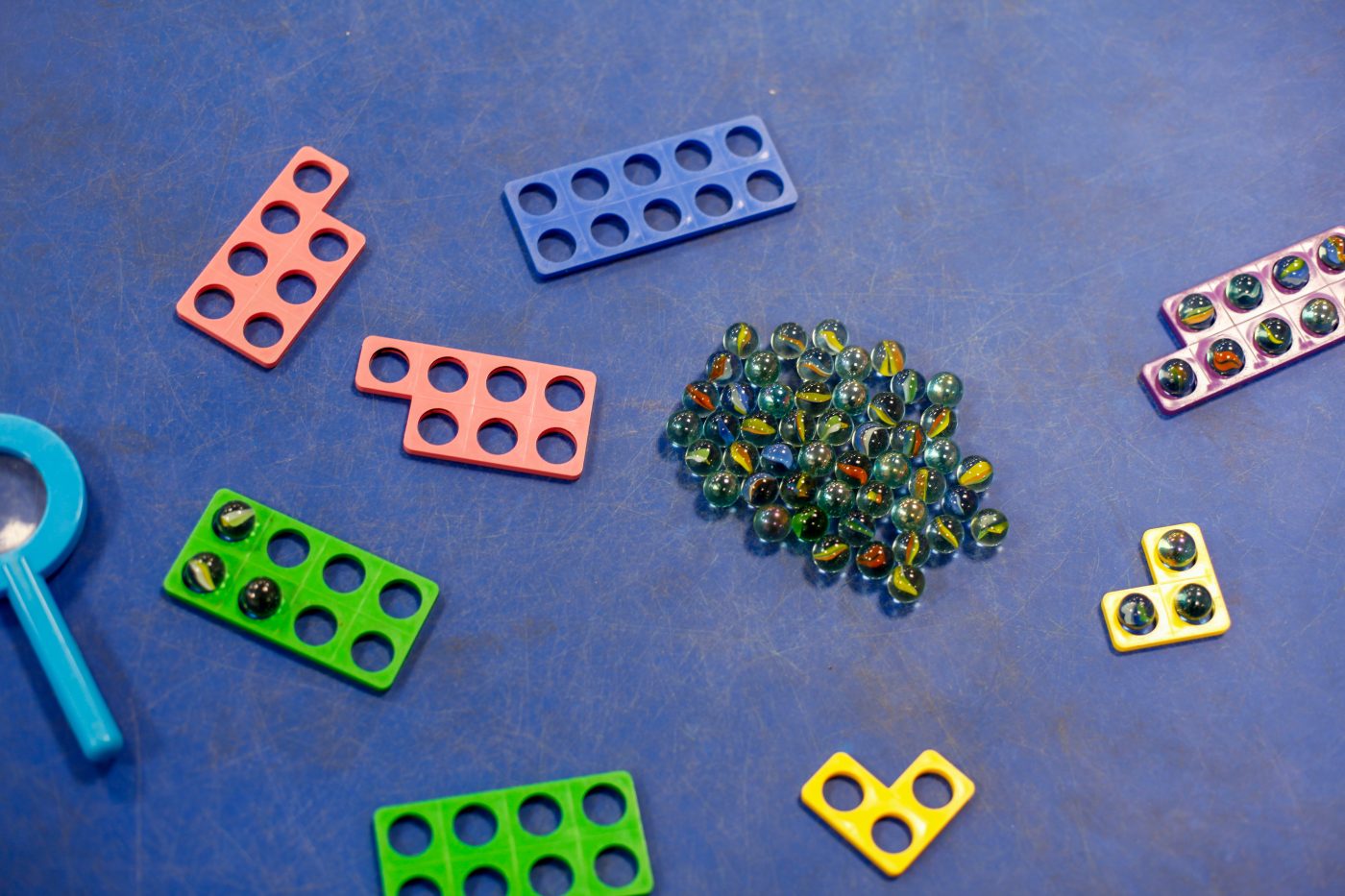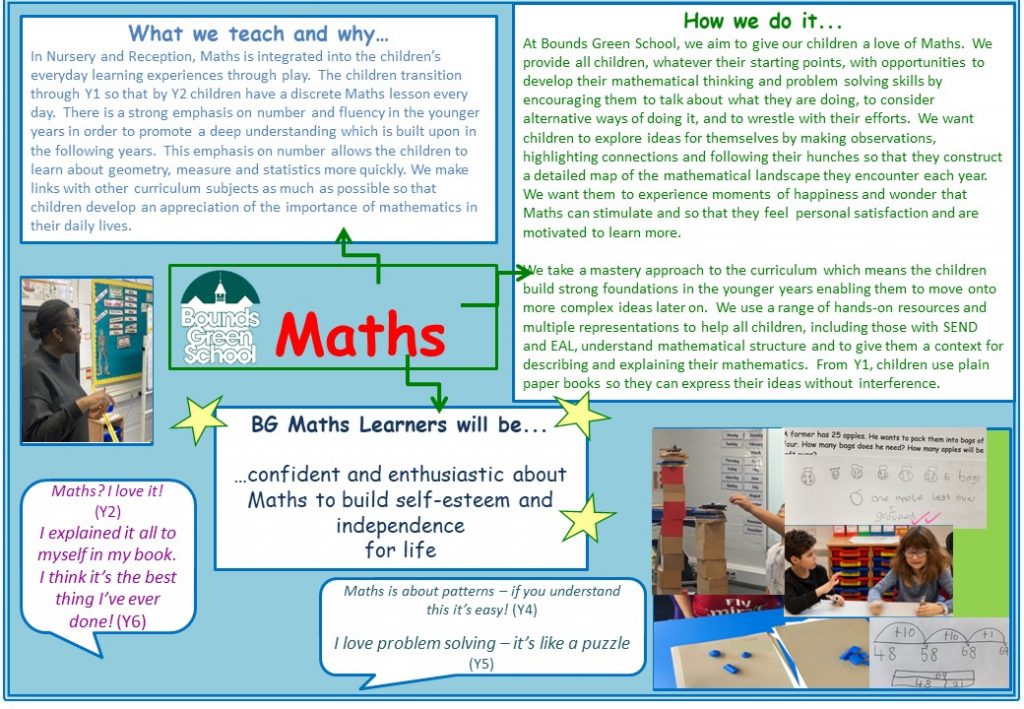Mathematics

Mathematics
Bounds Green is a happy and successful school community because:
· We CHALLENGE every child to be ambitious and achieve success in their learning.
· We VALUE respect and responsibility, individuality and inclusivity, confidence and kindness.
· We NURTURE each unique child to value themselves and develop self-worth in order to thrive in life.
Mathematics is a creative and highly inter-connected discipline that has been developed over centuries, providing the solution to some of history’s most intriguing problems. It is essential to everyday life, critical to science, technology and engineering, and necessary for financial literacy and most forms of employment. A high-quality mathematics education therefore provides a foundation for understanding the world, the ability to reason mathematically, an appreciation of the beauty and power of mathematics, and a sense of enjoyment and curiosity about the subject. (National Curriculum in England September 2013)
We expect every child to reach success by focusing on every child and fostering a growth mind-set.
Intent
Early Years Foundation Stage
The skills children learn in early years will be with them for the rest of their lives. In EYFS, children learn about counting and understand numbers to 10 in depth by learning how these numbers are related to one another and looking for patterns within them. By mastering number, the children acquire a strong foundation on which their future mathematical knowledge can build and they do this using real objects to apply and deepen their understanding and combine with vocabulary to help them describe and explain their ideas. Children also need rich experiences in order to develop ideas in shape, space and measure.
Children will develop:
- Counting skills beyond 20
- A deep understanding of all numbers to 10
- Automatic recall of pairs of numbers that make 5 and beyond to make 10
- Vocabulary of greater than, less than and equal to by comparing quantities
- Language linked to shape, length, weight, height, capacity, position, time and money
This will make them ready for Year 1
Key-Stages One and Two
Children’s understanding of number develops significantly through KS1 so that by the time they reach the end of Year 2, children are confident and fluent with whole numbers, counting and place value. This approach means they can confidently apply their understanding of number to other areas of mathematics such as measure where they study length, mass, capacity/volume, time and money, and statistics. They become increasingly knowledgeable about the properties of different shapes and the vocabulary used to describe them and they apply their knowledge of them to compare and sort them.
Concepts in number are developed further through KS2 with a focus on the four operations using both written and mental methods which involve increasingly large whole numbers. In time, they develop connections between multiplication and division with fractions and decimals, percentages and ratio so that they apply a deep understanding to a wide range of increasingly complex problems. This incremental development of ideas in number together with a more sophisticated vocabulary to describe and explain their ideas, underpins high-level teaching in measure, statistics, geometry and algebra.
Implementation
- A daily Maths lesson
- Based directly on the national curriculum programmes of study, our bespoke mastery curriculum is carefully sequenced and ‘elastic’ to ensure progression and depth of understanding which is essential before moving on
- By following the children’s needs, interests and individual experiences, our bespoke curriculum is based exactly on the children we see before us; it is relevant and meaningful to them, respectful of them and responsive to their lived experiences
- We emphasise vocabulary and language to help children describe, explain and remember their mathematical understanding
- Children review newly acquired vocabulary daily and revise prior vocabulary regularly to ensure progress is made, recall is strong and understanding is secure
- We use a wide range of manipulatives, pictorial representations and diagrams to support all children in gaining conceptual understanding of ideas and internal structures of numbers and operations.
- We ensure daily practice of fundamental number facts to help children store these in their long-term memory
- We encourage children to make connections based on known facts so that they realise they have access to an infinite number of other facts
- We scaffold and challenge all children to achieve confidence and independence in mathematics through the use of manipulatives, vocabulary and language, repetition and rapid intervention where appropriate
- We bring problem-solving to the foreground because we want children to explore ideas for themselves by making observations, spotting patterns, highlighting connections, following their hunches, considering alternative ways of doing something and to wrestle with their efforts
- Teachers’ expertise in maths teaching is developed through carefully identified CPD courses and by regular meetings and team-teaching with our AHT for Teaching and Learning / Maths Lead
- We assess children’s understanding through dynamic, short-cycle, formative assessment so that we can react quickly to any developing misconceptions
- Written summative test suites take place twice a year for children from Y2 – Y5, and more frequently in Y6.
Impact
- Regular monitoring and evaluation of children’s learning shows us that children’s attitudes towards mathematics are positive and that they are frequently excited by their learning
- Our monitoring of progress shows that children learn well and remember well
- KS1 outcomes are better than National at expected and above expected standards
- Progress in Mathematics at KS2 has improved each year since 2017 and that outcomes at the end of KS2 are higher than National at expected and above expected standards
- Feedback from secondary schools tells us that children from Bounds Green school achieve well in mathematics beyond primary school and many go on to study beyond GCSE.
Learning Multiplication Facts
The government expects the majority of children to know all times table facts up to 12 x 12 by the end of Year 4. An ability to retrieve these facts quickly will help your child develop fluency, become a much more successful mathematician and so make your child less likely to fall behind. If played often, this simple activity, using only a pack of playing cards, will help your child store the multiplication facts in their long-term memory. From Y2 – Y6, your child practices regularly in school. Further play at home will help your child learn these facts faster.
Here are some rules:
- Use the chart below to choose a times table and stick to it until your child can recall all the facts quickly without reference to a written list
- Form a list of facts by writing out the times table before you start
- Refer to your list straight away if you can’t recall the fact quickly
- Say the whole fact. Just saying ‘36’ for 12 x 3 is not enough. Say ‘Twelve times 3 is 36’
- Play for 4 minutes every day, taking it in turns to be the dealer and the ‘sayer’ for 2 minutes each.
| Year 2 | Year 3 | Year 4 | Year 5 | Year 6 |
| 2, 5 and 10 times tables | 2, 5 and 10 times tables
And 3, 4 and 8 times tables |
2, 5 and 10 times tables
And 3, 4 and 8 times tables And 6, 7, 9, 11 and 12 times tables |
2, 5 and 10 times tables
And 3, 4 and 8 times tables And 6, 7, 9, 11 and 12 times tables |
2, 5 and 10 times tables
And 3, 4 and 8 times tables And 6, 7, 9, 11 and 12 times tables |
Please note that this activity is designed to develop automaticity – that is being able to ‘…deliver a correct answer immediately from memory without conscious thought, as opposed to relying on calculation.’ (Stickney et al., 2012, cited in Baker & Cuevas 2018:2).
References
Baker, A.T & Cuevas, J. (2018) ‘The Importance of Automaticity Development in Mathematics’, Georgia Education Researcher

